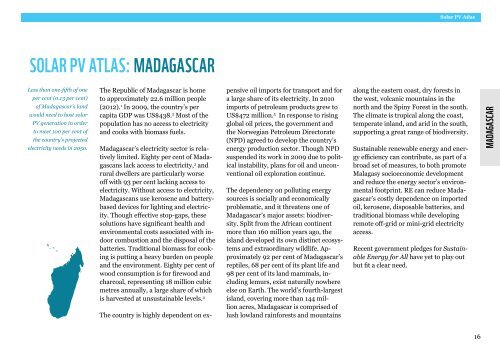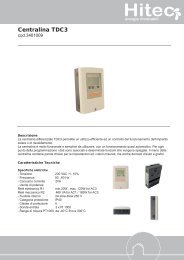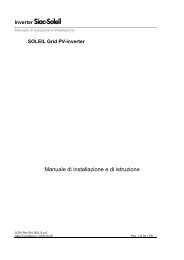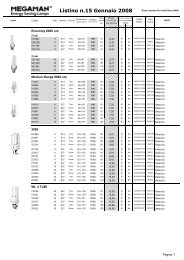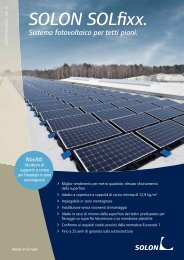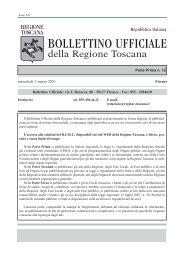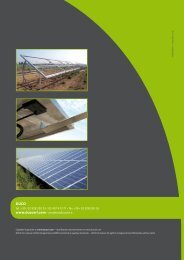Solar PV Atlas: Solar Power in Harmony with Nature - WWF
Solar PV Atlas: Solar Power in Harmony with Nature - WWF
Solar PV Atlas: Solar Power in Harmony with Nature - WWF
Create successful ePaper yourself
Turn your PDF publications into a flip-book with our unique Google optimized e-Paper software.
<strong>Solar</strong> <strong>PV</strong> <strong>Atlas</strong><br />
<strong>Solar</strong> <strong>PV</strong> <strong>Atlas</strong>: MADAGASCAR<br />
Less than one-fifth of one<br />
per cent (0.13 per cent)<br />
of Madagascar’s land<br />
would need to host solar<br />
<strong>PV</strong> generation <strong>in</strong> order<br />
to meet 100 per cent of<br />
the country’s projected<br />
electricity needs <strong>in</strong> 2050.<br />
The Republic of Madagascar is home<br />
to approximately 22.6 million people<br />
(2012). 1 In 2009, the country’s per<br />
capita GDP was US$438. 2 Most of the<br />
population has no access to electricity<br />
and cooks <strong>with</strong> biomass fuels.<br />
Madagascar’s electricity sector is relatively<br />
limited. Eighty per cent of Madagascans<br />
lack access to electricity, 3 and<br />
rural dwellers are particularly worse<br />
off <strong>with</strong> 93 per cent lack<strong>in</strong>g access to<br />
electricity. Without access to electricity,<br />
Madagascans use kerosene and batterybased<br />
devices for light<strong>in</strong>g and electricity.<br />
Though effective stop-gaps, these<br />
solutions have significant health and<br />
environmental costs associated <strong>with</strong> <strong>in</strong>door<br />
combustion and the disposal of the<br />
batteries. Traditional biomass for cook<strong>in</strong>g<br />
is putt<strong>in</strong>g a heavy burden on people<br />
and the environment. Eighty per cent of<br />
wood consumption is for firewood and<br />
charcoal, represent<strong>in</strong>g 18 million cubic<br />
metres annually, a large share of which<br />
is harvested at unsusta<strong>in</strong>able levels. 4<br />
The country is highly dependent on expensive<br />
oil imports for transport and for<br />
a large share of its electricity. In 2010<br />
imports of petroleum products grew to<br />
US$472 million. 5 In response to ris<strong>in</strong>g<br />
global oil prices, the government and<br />
the Norwegian Petroleum Directorate<br />
(NPD) agreed to develop the country’s<br />
energy production sector. Though NPD<br />
suspended its work <strong>in</strong> 2009 due to political<br />
<strong>in</strong>stability, plans for oil and unconventional<br />
oil exploration cont<strong>in</strong>ue.<br />
The dependency on pollut<strong>in</strong>g energy<br />
sources is socially and economically<br />
problematic, and it threatens one of<br />
Madagascar’s major assets: biodiversity.<br />
Split from the African cont<strong>in</strong>ent<br />
more than 160 million years ago, the<br />
island developed its own dist<strong>in</strong>ct ecosystems<br />
and extraord<strong>in</strong>ary wildlife. Approximately<br />
92 per cent of Madagascar’s<br />
reptiles, 68 per cent of its plant life and<br />
98 per cent of its land mammals, <strong>in</strong>clud<strong>in</strong>g<br />
lemurs, exist naturally nowhere<br />
else on Earth. The world’s fourth-largest<br />
island, cover<strong>in</strong>g more than 144 million<br />
acres, Madagascar is comprised of<br />
lush lowland ra<strong>in</strong>forests and mounta<strong>in</strong>s<br />
along the eastern coast, dry forests <strong>in</strong><br />
the west, volcanic mounta<strong>in</strong>s <strong>in</strong> the<br />
north and the Sp<strong>in</strong>y Forest <strong>in</strong> the south.<br />
The climate is tropical along the coast,<br />
temperate <strong>in</strong>land, and arid <strong>in</strong> the south,<br />
support<strong>in</strong>g a great range of biodiversity.<br />
Susta<strong>in</strong>able renewable energy and energy<br />
efficiency can contribute, as part of a<br />
broad set of measures, to both promote<br />
Malagasy socioeconomic development<br />
and reduce the energy sector’s environmental<br />
footpr<strong>in</strong>t. RE can reduce Madagascar’s<br />
costly dependence on imported<br />
oil, kerosene, disposable batteries, and<br />
traditional biomass while develop<strong>in</strong>g<br />
remote off-grid or m<strong>in</strong>i-grid electricity<br />
access.<br />
Recent government pledges for Susta<strong>in</strong>able<br />
Energy for All have yet to play out<br />
but fit a clear need.<br />
MADAGASCAR<br />
16


